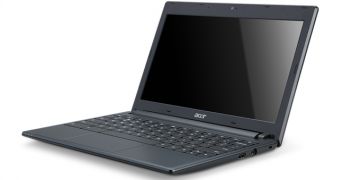As end-users know, the past few days finally saw the emergence of netbooks powered by Chrome OS, Google's newest operating system, but as products get launched, the question arises on just how it will fare considering current and future development.
The Chrome OS operating system is something that has been the subject of discussion for a very long time.
When it was first hinted at, the market of mobile computers was one where netbooks still had a very big presence and slates were barely even acknowledged.
Now, however, slates are actively reducing the market share of netbooks, to the point where the latter are expected, by some, to be reduced to a niche market.
The Chrome OS is seen as a sort of means to revitalize this segment, but even with Samsung and Acer supporting it, among others, things are far from certain.
In fact, even though the OS acts like a browser and has everything happen in the cloud, bringing along all the benefits associated with online operation, this might not be enough.
For one, Chromebooks, as they are called, aren't very affordable (Acer's model is listed at $349).
The machines do have frames somewhat larger than the regular netbook, but with Intel having decided to lay off on restrictions, this advantage won't be very long-lived.
There is also the fact that the ARM architecture is getting more popular and might even start to show up in low-cost laptops once Windows 8 (which supports the chips) is released.
All in all, the Chrome OS didn't come out at a very opportune time and, while it might still gain some measure of popularity, it is unlikely to ever reach the heights it could have aimed for if it had come out sooner, like last year.
With slates in full bloom, Google can, at least, focus more on Android development (Android 3.1 is already getting attention) while monitoring Chromebook marketing performance.
Computex 2011 will, most likely, act as a proving ground of sorts, even though not many Chromebooks will be ready to sell by then. Either way, whether directly or indirectly, Chrome OS has to compete against both Windows and Android, something point towards easy times ahead.
Then again, laptops aren't the only area where the new operating system can show its worth, so things are still up in the air.

 14 DAY TRIAL //
14 DAY TRIAL //